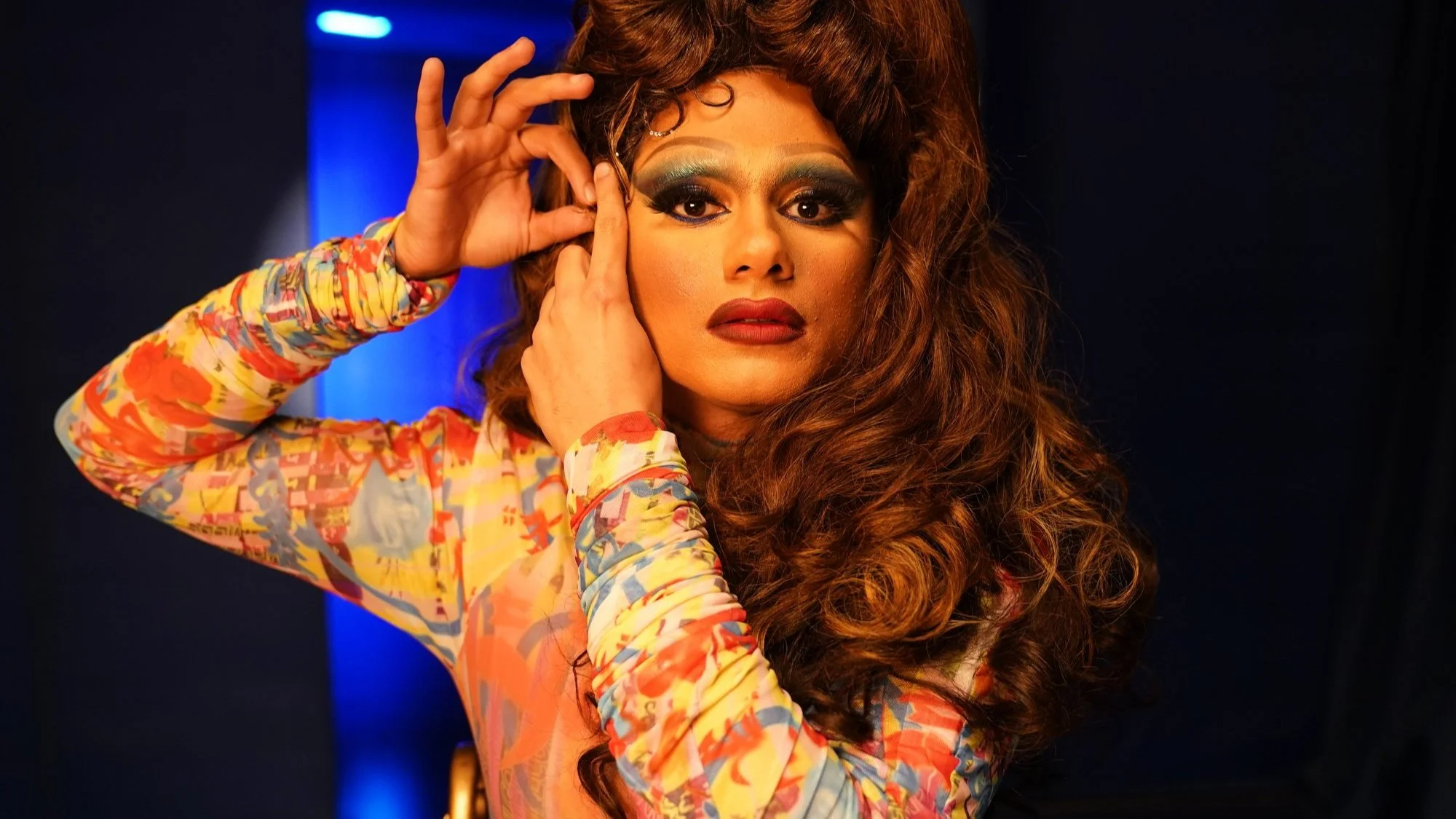Layla
An Anglo-Iraqi drag queen from a strict Muslim family falls in love for the first time…
Image courtesy of Curzon Film Distributors.
Layla is a debut feature by writer/director Amrou Al-Kadhi who is, I understand, himself non-binary and performs as a drag queen. That means that he is well familiar with the world that he portrays here since the titular character played by Bilal Hasna echoes both of those aspects of Al-Kadhi. The non-binary element is central enough to mark out Layla from other recent titles that are otherwise directly comparable (a year ago we had Femme and last July saw the UK release of Unicorns both of which focused on a drag queen involved with another man). I felt that Femme, a much darker film than Layla, was somewhat overrated but Unicorns struck me as outstanding and likely to be meaningful to any audience regardless of the viewer’s sexuality. In the case of Layla we have in contrast a film that will work best for those who can identify directly with the lifestyle depicted in it.
What is beyond doubt is that Bilal Hasna is admirably cast as Layla and that Al-Kadhi has given us a colourful film (photography by Craig Dean Devine, costumes by Cobbie Yates), one which bursts forth with a rhythmic flourish. The energetic appeal of all this is doubtless very much what Al-Kadhi wished to communicate but he is rather less successful when, as writer, he seeks to feature a love story. This arises when Layla falls for a gay man from a very different background and with a decidedly contrasted outlook. He is Max (Louis Greatorex) who in this London-set movie works in the city as a marketing executive. They meet at an event set up by a fast-food company where Layla is performing in drag (the business is playing up its liberal image) but finds that he is being paid not in cash but in vouchers. Being angry at this, he decides to make a scene which rather improbably attracts Max, but the film’s lack of conviction also extends not infrequently to passages of dialogue (one of the least persuasive instances is to be found in repeated references to octopuses regarded by Max as creatures epitomising freedom).
This particular story is one that contrasts the non-binary attitude of Layla who is thoroughly at home with like-minded friends in the gay club known as Feathers with that of Max whose inability to feel truly at home in their company is all too apparent. Because Max’s ways are so different from those of Layla, the question becomes whether or not the relationship between them can last. The conflict it creates is most effectively highlighted in a scene late on when Max has decided to introduce Layla to his sympathetic parents. In doing so he gets Layla to adopt a more appropriate image by introducing Layla to his parents as Latif (that’s the name by which Layla remains known at home where Layla is not out in any sense at all). Max is also careful when talking of his companion’s work as a performer to describe his stage act as that of a comedian and not as that of a drag queen. Ultimately Al-Kadhi seems to be asserting not just that it is better to be out but that, on account of it leaving one open to all possibilities, being non-binary is the most desirable way to be.
The limitations of Layla are particularly apparent when one compares it with Unicorns. In that film the central characters had real depth. The drag queen in Unicorns was a Muslim named Ashiq and his relationship with his family with whom he was not overtly open was dealt with in a manner that displayed depth and subtlety both in the writing and in the playing. Layla does include a scene in which on a home visit we meet Layla’s parents who are British Palestinians living in England and are hoping that their son, the sedate Latif, will marry a nice girl. But even though Layla’s sister, Fatima (Sarah Agha), comes back into the story later none of this does more than skim the surface. Similarly, although the film takes a very positive view of the camaraderie that Layla's friends at Feathers exhibit, these characters are not built up and hardly register as individuals.
Al-Kadhi’s approach is such that music including song is often featured on the soundtrack and for the right audience that will add to the film’s appeal. If Louis Greatorex as Max is more limited by the writing, there is no doubt that Bilal Hasna makes the most of his role as Layla capturing all sides of the character with aplomb. But, even so, the fact remains that the wider appeal of Unicorns which also added much to its quality is missing here.
MANSEL STIMPSON
Cast: Bilal Hasna, Louis Greatorex, Safiyya Ingar, Sarah Agha, Darkwah, Terique Jarrett, Rebecca Lucy Taylor, Baby, Tim Berrington, Ruby Thomas, Ali Barouti, Emma McDonald, Matthew Jacobs Morgan.
Dir Amrou Al-Kadhi, Pro Savannah James-Bayly, Screenplay Amrou Al-Kadhi, Ph Craig Dean Devine, Pro Des Soraya Gilanni Viljoen, Ed Fiona Brands, Music CJ Mirra, Costumes Cobbie Yates.
Fox Cub Films/Film4/BFI/Significant Productions/Public Dreams/Aum Group-Curzon Film Distributors.
100 mins. UK. 2024. UK Rel: 22 November 2024. Cert. 15.


